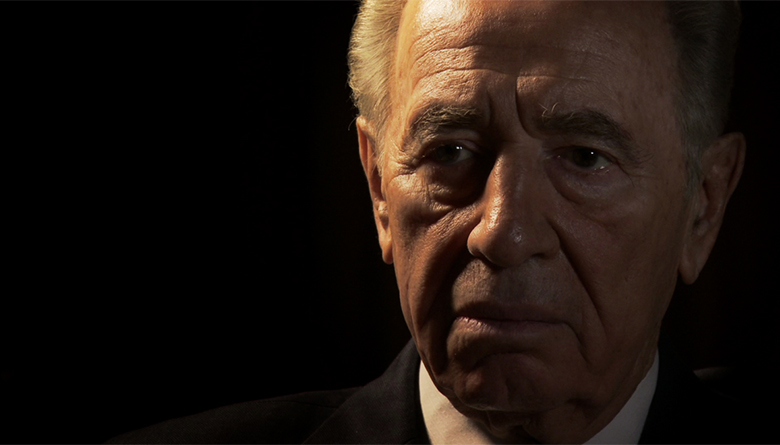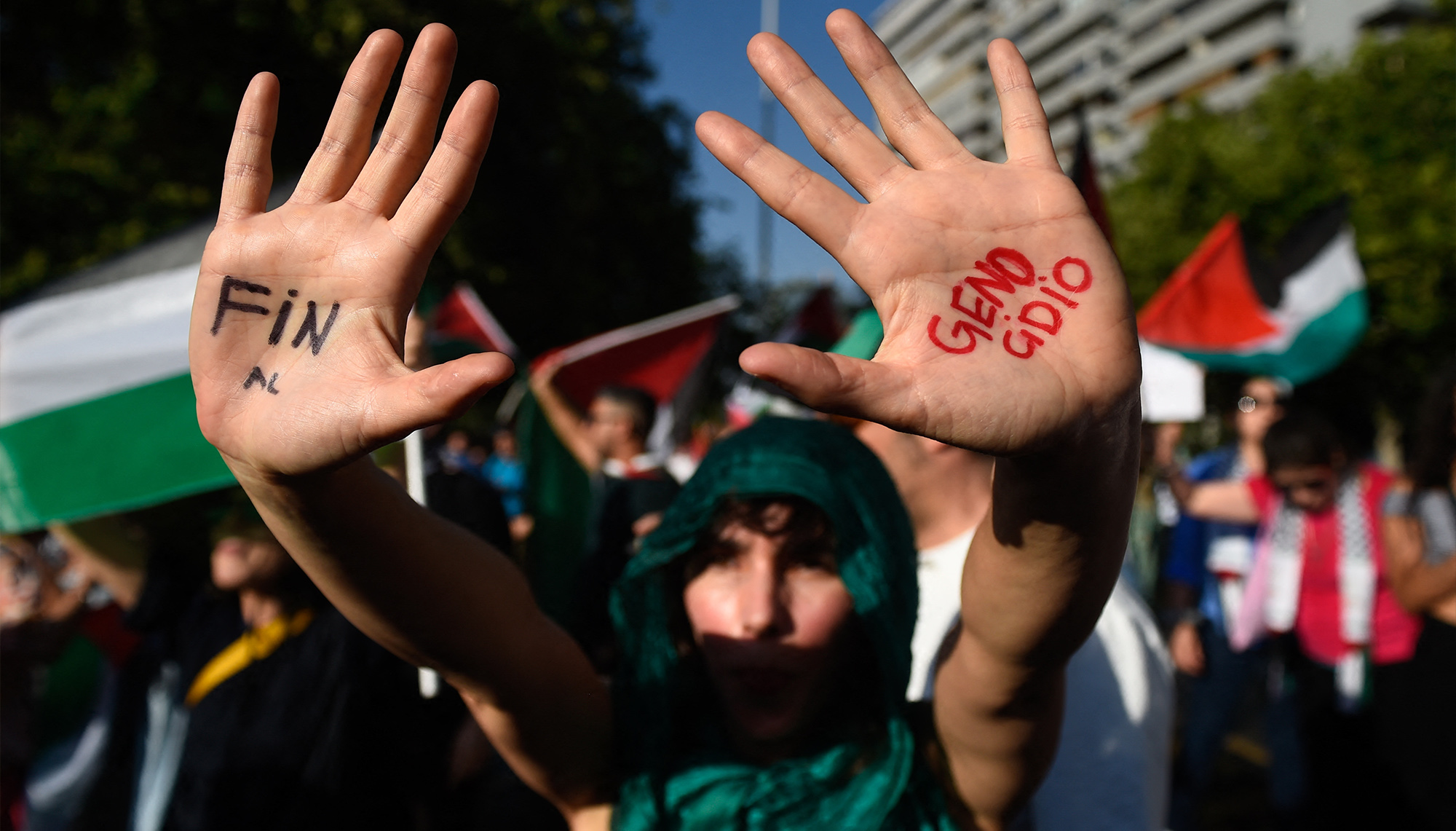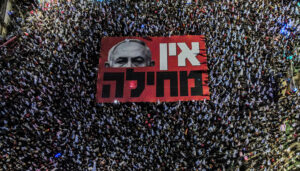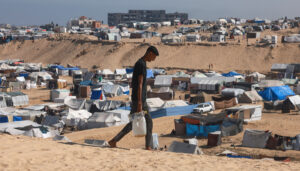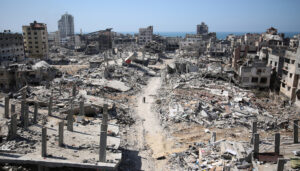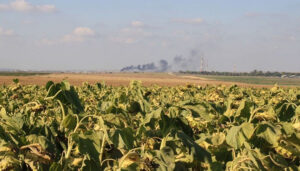By Omar Khalifeh
Translated by Hani Barghouthi
This article was first published on 7iber in Arabic.
Sa’id S. stands in front of his son Dov, formerly known as Khaldun. Sa’id and his wife Safiyya had been forced to leave their infant son at home when the Palestinians were displaced from Haifa in 1948. Sa’id returns twenty years later to find his house and son, only to discover that an Israeli family had taken over the house and adopted his son, renaming him Dov. Dov was now an Israeli soldier. When the father confronts his son, Dov refuses to placate his father and pledges allegiance to Israel. He goes on to place the blame on his parents for abandoning him during the Nakba. After a heated argument about the concepts of homeland and memory, Sa’id reveals to his stolen son that he has a brother, a brother named Khaled who fights with the Palestinian resistance. “Your first battle may be with a man named Khaled, and Khaled is my son. Please note that I didn’t call him your brother; like I said, a human is defined by their cause, and Khaled joined the resistance last week. Do you know why we didn’t name him Khaldun? Because we were counting on finding you, even if it took twenty years. But that’s not going to happen. We haven’t found you, and I don’t think we ever will.”
This is a difficult scene from Ghassan Kanafani’s important novel, Returning to Haifa. The difficulty lies in its depiction of a painful truth; the permanent loss of Palestine. This does not necessarily mean that Palestine will never be liberated, or even that Zionism will forever reign victorious. What it does mean however, is that even if Palestine were to be returned, it would never be the same Palestine as the one etched into the minds of those Palestinians who once knew it and were forced to leave behind for generations, carrying nothing but pictures and memories, in the hope of liberation. At the hands of military leaders, Palestinians and their allies were portrayed as war criminals, and Palestine was wiped from existence in 1948. And on the opposing side of this conflict and indeed the world, stand the founding fathers of “Israel”.
The death of Shimon Peres, the last of these so-called founding fathers to go, brings with it a reminder of the impossibility of ever achieving justice in Palestine.
Shimon Peres’ death is, without a doubt, an incredibly significant event. His death means that now not one of the Zionist leaders remain, who were responsible for the theft of Palestine and the subsequent assault on its language, people, and memories. He died in a way reminiscent of the country he helped to create, with a fabricated image geared towards media promotion to transform him, in the public-eye, into a peace- maker, or further still a philosopher. The scale of contradiction in this image is such that only his victims and their sympathizers can comprehend. Somewhere between the two conflicting images stand the Palestinians, stunned both by history’s ability to erase and the ability of the powerful to deny.
Justice was buried as soon as the tragedy began, obliterated by the Nakba forever.
Moving past the crimes and atrocities this man committed, despite their importance, Peres’ death forces us to face the quandary of Palestinian justice. This does not just mean that Peres died, and Sharon and Shamir and the like before him, without legal retribution for his actions. While that may be the simplest and most direct explanation for the absence of justice in Palestine, the issue of ‘Justice’ itself is far deeper than that. Even if these individuals were to be brought to trial, and even if the refugees were to be returned, and even if Palestine itself were to be returned it would still be impossible for the Palestinians to be afforded justice. ‘Justice’ is a ship which sailed as soon as the Palestinian cause began. In other words, justice was buried as soon as the tragedy began, obliterated by the Nakba forever.
So what does justice mean in Palestine? No matter what a solution to the conflict might look like, assuming one is indeed possible, it will only concern the future, and its generations. Generations born after that hypothetical solution may have a new set of a memories, a new reality, which may be just. But what of the Palestinian of the past and present? It can be argued here that justice, in this context, does not exist.
The term “transitional justice” was created legally to signify the steps taken by some countries ravaged by tragedies, atrocities, and human rights violations, in order to treat the results of these violations, bring their perpetrators to justice, indemnify the victims and apologize to them. The most famous example of this taking place is South Africa after the fall of apartheid. There is no doubt that this is a vital process for a society on the road to acknowledging its past and moving forward, but it is not justice. How do you compensate someone killed by white people in South Africa or by Israelis in Palestine? How do you do the same for Palestine’s refugees? Its prisoners and its victims? What about Palestinians who incurred no direct tangible harm, whatever that means? What form does justice assume here? How do you compensate for marginalised memory, nonexistent existence or immeasurable pain?
This, of course, has no effect on the importance of fighting for Palestine. Resisting Zionism is a basic right, along with all its implications of freeing Palestine of Zionism and bigotry and releasing Palestinians from the shackles of cruelty and returning their rights and their lands to them. But that is one thing and justice is another. Ending cruelty isn’t justice. Justice would be returning to a world in which the cruelty didn’t happen in the first place
Peres’ death is a reminder of something else; it is the death of one of the people who saw Palestine before, and Palestine after. Most Palestinians today have not seen Palestine before 1948. A tragedy of the post-Nakba generations is that they have only seen Palestine in the way that Peres and his comrades allowed. Peres is an inherent part of how Palestinians define themselves; “Israel” did not just steal Palestine, it stole the ability to comprehend a Palestine that did not include “Israelis”. In every Palestinian story, fable, poem, elegy, and joke, there is an Israeli. The Israeli is there whether visible or not, palpable or abstract. They’re there even if we wanted to forget them, if only for a moment. Peres, therefore, is not just an enemy; he is a part of what it means to be Palestinian. To be Palestinian is to be from the Palestine that came after, the Palestine in which Shimon Peres lived and which he molded.
With this depressing definition of identity, Peres becomes a part of Palestinian memory, and consequently, his death is a sort of loss of this memory. Peres witnessed things many Palestinians could not, and therefore has the answers to questions that still torture the Palestinians. How did this multi-decade nightmare begin? Not just the military matters concerned with wars fought against “Israel”, nor the crimes committed during the Nakba and Naksa and the wars in Lebanon and whatever came in-between. No, it is much more intimate and personal. What happened to that street in Safad? How, exactly, did that family in Yafa leave? This house, that tree over there, those who left and died on the way out, those who abandoned their belongings in their homes. What became of all this? Peres possessed knowledge of Palestinians in exile and of their homes and lands that equalled their own, possibly even surpassing it. What could be crueler than needing your murderer to tell you who, exactly, you are? Peres contained the part of us that we never knew. He hid in his folds our belongings and our emptiness. The stories of our mothers and fathers who were killed. Their last moments, staring into his eyes with nothing but loathing in theirs. The shape of the night that sheltered Palestinians in their long and painful exodus. How could all of that simply die?
Peres is an unavoidable evil for Palestinians. They need him alive, not dead. They yearn to extract every Palestinian scene from his memory. They want back their memories that he stole. A criminal such as this one does not deserve to die and take with him the Palestinians’ Palestine. This is theft, multiplied. While he still lived, there was hope of some form of retribution for him, a victory over the hatred he lived. He should have stayed alive, should have seen us continue to hope, despite the imposed desperation, for better days to come.
Let’s return to Ghassan Kanafani. In a different part of the same novel, Sa’id S. asks his wife Safiyya: “Do you know what a home is, Safiyya? A home is when none of this happens.” Home has become a lack of home, an absence which has turned home into tragedy. Palestine is not an identity. It’s a catastrophe imposed upon a people, who never wanted it. The Palestinians did not want Palestine to be a hypothetical, a poem, or a novel. They may have simply wished for it be a flat, abandoned space for them to live safely in. Home is where home does not turn into blood and water. Unfortunately, it has.
Even if Palestine were to be returned now, it will never return. This is the quintessential lack of justice for Palestine. And when Mahmoud Darwish returned to Palestine after a long absence, he spoke his famous words: “I came but I have not arrived, I came back but I have not returned.” For Palestine to return, it needs to have never left. Palestine after 1948 will not resemble the Palestine before it. That year is etched into the minds of Palestinians, defining them. Justice for Palestine means no Nakba or Naksa, it means no prisoners or refugees. Justice for Palestine means turning the clock back to before this tragedy started and stopping it there. Everything that came after is a permanent, irreparable denial of justice. The Palestinians may one day return. Zionism may end. Some solution, a coexistence may come into being. But would only be a make-do solution, not a just one. Just peace is a myth, an oxymoron. The Palestinian Dictionary cannot contain the word “justice”. For real justice to exist, Palestine should never have been lost.
